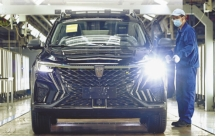
By Li Panpan
The production and sales of new energy vehicles in China both increased more than 40% in April, despite that the Omicron pandemic lockdown hurt the automobile industry as a whole. Now comes prediction that with more automobile manufacturers and suppliers resuming work and production, new energy vehicle market might encounter chip shortage again in June and July.

China Academy of Information and Communications Technology(CAICT) recently released a report of the new energy vehicle industry in April, saying the growth of new energy vehicles remained resilient although the whole automobile industry was hit by the pandemic.
The report said that, the overall production and sales of automobiles in April in China fell by 46.1% and 47.6% year-on-year respectively, while those of new energy vehicles numbered 312,000 and 299,000 respectively, a year-on-year increase of 43.9% and 44.6% respectively.
In mid-to-late April, automakers such as Tesla and SAIC and supporting suppliers resumed work and production one after another. With smooth logistics and supply chains, the production and sales of new energy vehicles are expected to rebound steadily.
Shanghai lifted lockdown restrictions on June 1. Most automobile companies resumed work and production.
However, car industry observers have warned about chip shortage that could hinder car companies again. Shanghai’s leading automobile maker SAIC estimates that factories catching up in production will make chip shortage more obvious, leading to shortage peaks in June and July. It needs to tackle the issue, linking up with various component suppliers.
He Xiaopeng, founder of Xpeng Motors - the leading EV startup, shared in a recent social media post that an EV has about 5,000 pieces of chips in a few hundred of types and it is those that cheap ones, not expensive advanced ones that are in shortage.
Xin Guobin, Vice Minister of the Ministry of Industry and Information Technology said the automobile industry is an important pillar of the national economy and government departments at various levels will provide strong support to the industries, stimulating consumption and stabilizing the economy.
RELATED
-
BYD plans to establish a sodium-ion battery plant in eastern China’s Xuzhou with an investment of RMB10 billion ($1.4 billion)
11-20 17:51 -
Apple’s Chinese supplier Luxshare Precision gives up $330 million investment in India
11-20 17:28 -
European Commission President von der Leyen will visit China in wake of the EU’s ongoing probe into China’s subsidies on EV industries
11-20 16:59
READ MOST

No Data Yet~







